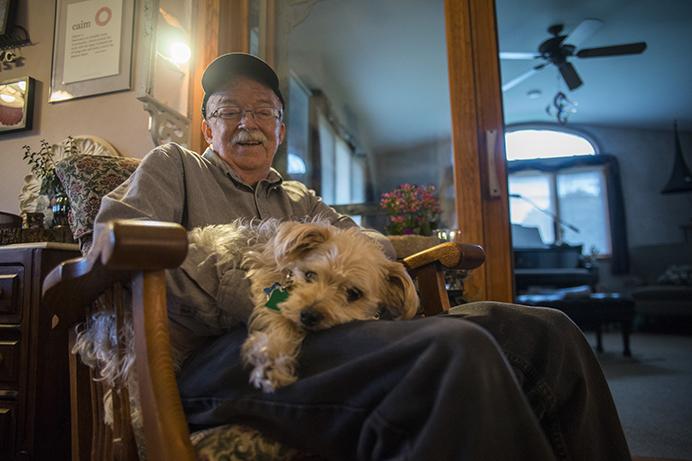Don Music celebrated his 30th anniversary of heart transplant surgery at UIHC.
By James Geerdes
Two heart transplants, a kidney transplant, and skin cancer can’t keep Don Music away from what he loves.
Thirty years ago, Don Music, a Coralville resident, had his first heart surgery at the University of Iowa Hospitals and Clinics. Then, five years later, he had his second, which he said was the UIHC’s first time performing a second heart transplant on one patient.
Music lives at home with his wife, Julie Music, and his daughter, Meredith. Even after undergoing several surgeries and procedures, he has kept a steady job as an electrical designer for Shive-Hattery, an engineering firm in Iowa City.
In 1986, he worked as a carpenter in Colorado who hunted in his spare time. That year, he said he experienced viral cardiomyopathy, meaning his heart was unable to pump enough blood for his body, and he ended up in a hospital bed at UIHC.
The experience was life-changing, he said. It was at UIHC where he met Julie, and the two have now been married for 28 years. Following his transplant, he went to Kirkwood for two years to become an electrical designer.
“Everything is different,” Don Music said. “… I definitely think [my first heart surgery] put me in a better place.”
Meredith, an incoming sophomore at the University of Iowa, is a piano performance major on a pre-med track, largely thanks to her father’s medical feats, she said.
“I’ve grown up seeing how amazing medicine is and how a doctor has changed one person’s life,” she said. “And that’s what I want to do in the future.”
A 1991 viral infection caused Don’s immune system to reject his transplanted heart, which put the UIHC doctors in a predicament.
“They had never done a second heart transplant on the same patient before,” Don said. “They made me take all these tests to see if I was capable of it. I managed to pass all of the tests for the second heart transplant, and got listed, then became the first successful two-time heart transplant.”
RELATED: Event honors organ donors, recipients
Don said he followed his transplant by living a vibrant and healthy life, sticking to a very strict diet, and raising his daughter. Meredith said that his medical troubles have only made him stronger.
“He has always been pretty good spirited,” Meredith said. “Through all of this he has a really good sense of humor. He loves to play pranks on people in the hospital. In a way, it has kind of strengthened his personality.”
Eighteen years after his second transplant, Don said the uncertainty surrounding the long-term effects of his procedures caught up with him. Cyclosporine, a drug used to prevent organ rejection, was relatively new to the medical field when Don was undergoing his transplants. Doctors were unsure of what safe dosages were for patients due to the unfamiliarity of the drug’s effects, Don said.
“[Doctors] usually were conservative and over-medicate people early on,” Don said. “[The drugs] initially damaged my kidneys then they adjusted the levels. This held up for 20 years then I needed dialysis for my kidney until I could get a transplant.”
Through those 18 years, Julie said Don did not plan on letting his dialysis prevent him from working in Iowa City consistently.
“Don worked through his dialysis, which was unheard of at that time,” Julie said. “… He was considered the king of dialysis.”
When a kidney became available for Don, he underwent yet another successful UIHC organ transplant, and continued working at Shive-Hattery soon after his surgery.
“I can’t say enough about the staff and the people that we know,” Julie said. “He has some life-long friends, and those were the people that pulled him through.”
Three years later, Don kept working after undergoing yet another successful surgery at UIHC.
But as the years of being prescribed different medications started to add up, the surgeries took a larger toll on Don’s health. In January 2016, Don was diagnosed with squamous cell carcinoma, a form of skin cancer commonly linked to transplant medications. Currently, Don is undergoing chemotherapy and radiation at UIHC. A July CT scan showed that the cancer was receding.
Despite the diagnosis, Don remains optimistic for the future. He scheduled a trip to go deer hunting in October. In the meantime, Don is undergoing chemotherapy and radiation at UIHC, and doctors have told his family that the cancer is receding.
“Don is a very strong person; nothing is going to keep him down,” Julie said.







